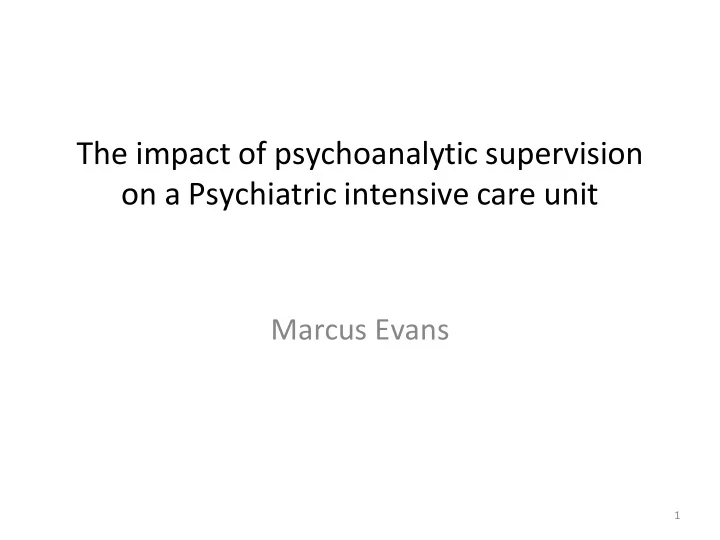

The impact of psychoanalytic supervision on a Psychiatric intensive care unit Marcus Evans 1
Withdrawal from the world of shared reality Patients who suffer from a psychotic illness and/or personality disorder, • project aspects of their ego and their minds capacity to register psychic pain into the external world. ‘Beta elements’ lumps of concrete experience that do not invite symbolic • resonance projected into those around them and tend to provoke reactions rather than thought. Concrete communication is stripped of symbolic value and any capacity to • convey emotional significance, creating a gulf that leaves professionals feeling alienated and deprived of meaningful contact. Richard Lucas used emphasis the need to rediscover meaning through free association to patients concrete communications. Whereas Freud described dreams as the royal road to the unconscious, • Richard Lucas used to describe the counter transference as the royal road to unconscious with patients in psychotic states of mind. (Mr. S) 2
The effect of psychotic process on professionals Professionals can respond to feelings of alienation by becoming • mechanistic in their thinking, leaving patients feeling that they are being dealt with by professionals who keep patients and their suffering at too great a distance. Alternatively, professionals may try to get rid of the patient or crush the • psychosis by attacking it with aggressive doses of medication designed to eradicate psychotic signs and symptoms . Professionals need to be supported in taking an interest in the meaning of • their patients’ symptoms and their verbal and physical communications, which may convey important information about the patient’s internal world and underlying conflicts. Therapeutic work depends on professionals’ willingness to be disturbed by • the patients communication while not being overwhelmed. (Mr. L) 3
Therapeutic relationships • Establishing a therapeutic relationship with patients is complex and may itself be prone to false alliances, deceptions, and denial. • Professionals may unconsciously go along with patients ’ denial and rationalization by trying to understand them at a neurotic level alleviating painful realities about the extent of the patient ’ s damaged mind. • Alternatively professional may develop a hard, external skin designed to keep the patient and his or her disturbance at a distance and give the impression of cruel indifference may become too identified with the patients view and state of mind. • In order to develop and maintain a balanced approach, clinical staff will need settings and structures and, I would argue, a model that helps them to digest the anxieties and pain involved in therapeutic relationships. (Mr. T) 4
The value of a psychoanalytic supervision The Psychoanalytic model is particularly helpful when thinking about • psychotic or borderline functioning, and it can restore the missing emotional meaning to concrete communication or acting out. It can improve clinicians’ capacity to remain interested in their patients’ • emotional life and enable the clinicians to listen out for rare moments of meaning, even where the predominant or prevailing discourse seems utterly stripped of significance. These opportunities can help some professionals separate from their • identification with the patient and restore an objective clinical approach, while others are helped to reflect on hardened attitudes in the interests of becoming more emotionally available. Psychoanalysis offers a model for thinking about, and providing meaning • for, the anxieties that drive us “ out of our minds ” , and this can reduce the risk of thoughtless action. (Mr. G) 5
Recommend
More recommend